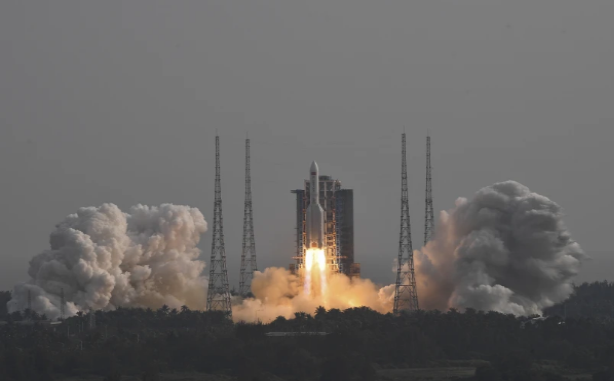
In this photo released by Xinhua News Agency, the Long March-5B Y4 carrier rocket carrying the space lab module Mengtian blasts off from the Wenchang Satellite Launch Center in south China’s Hainan Province on Oct. 31, 2022. (Hu Zhixuan/Xinhua via AP, File)
| Published August 7, 2025
What’s Happened?
-
On August 5, 2025, the Philippine government strongly condemned a recent Long March‑12 rocket launch by China, which resulted in suspected debris falling near Palawan province.
-
The incident occurred late Monday night (August 4), prompting alarm among residents of Puerto Princesa city and nearby towns. They reported loud explosions, a fireball streaking across the sky, and even ground tremors.
-
Thankfully, no injuries or damage were immediately reported. However, national security officials highlighted the clear danger posed to land areas, ships, aircraft, and fishing vessels in the vicinity of the debris drop zones.
Official Response & Safety Measures
-
National Security Adviser Eduardo Año issued a strong rebuke, calling China’s actions “irresponsible testing” that alarmed the public and placed people at risk.
-
The Philippine Space Agency identified two potential debris zones—approximately 21 nautical miles from Puerto Princesa and 18 nautical miles from Tubbataha Reef—and warned the public against touching any found fragments due to possible toxic fuel residues.
-
In response, Philippine aircraft and vessels were dispatched to search for debris, and authorities urged anyone who discovers fragments to report them immediately—but not to handle them.
Context & Broader Significance
-
This marked the 587th mission of China’s Long March rocket series; the Long March‑12 successfully delivered a set of internet satellites into orbit from Hainan province.
-
It remains unclear whether China notified neighboring countries, including the Philippines, about its expected debris trajectories in advance.
-
Similar incidents in the past have seen debris falling closer to or over the Philippine archipelago, raising ongoing safety and diplomatic concerns.
 Implications:
Implications:
Here are the key implications of the Chinese rocket debris incident near Palawan for the Philippines and the broader region:
🇵🇭 1. National Security Concerns
-
The uncontrolled reentry of rocket debris into waters near Palawan, a strategic location, raises concerns over Philippine territorial security.
-
It shows how foreign space activities can pose real-world risks to other nations, especially in contested regions like the South China Sea.
⚠️ 2. Public Safety Threats
-
Loud explosions, visible fireballs, and tremors frightened civilians in Puerto Princesa and nearby areas.
-
Authorities warned of toxic rocket fuel residue, emphasizing the danger to civilians, fishermen, and responders.
-
Future incidents could cause actual casualties or environmental contamination if debris lands in more populated areas.
🌐 3. Lack of International Coordination
-
It’s unclear if China informed the Philippines ahead of time about the rocket launch or the potential debris zones.
-
This suggests a gap in space launch transparency, which increases risk for neighboring countries.
-
There is growing pressure for stronger international protocols on space debris notifications, especially in populated regions.
🛰️ 4. Space Militarization & Regional Tensions
-
The Long March rocket was carrying satellites—raising suspicion over whether they were strictly civilian.
-
The incident adds to the already tense geopolitical atmosphere in the region, especially regarding China’s actions in the South China Sea.
-
It could contribute to a more aggressive stance from the Philippine military or closer ties with allies like the U.S. or Japan on space and security.
📢 5. Diplomatic Fallout
-
The Philippine government condemned China’s launch as “irresponsible testing.”
-
This may further strain Philippines-China relations, which are already fragile due to maritime disputes.
-
The incident may become a talking point in ASEAN and UN forums, where countries demand more responsible space behavior.
 Overall Takeaway:
Overall Takeaway:
The recent Chinese rocket launch that caused suspected debris to fall near Palawan is a stark reminder that space activity is no longer isolated from real-world consequences on Earth—especially for countries like the Philippines that lie beneath common launch paths.
This incident highlights the urgent need for international accountability, stronger safety protocols, and improved communication between spacefaring nations and their neighbors. It also underscores how China’s expanding space ambitions are increasingly intersecting with geopolitical tensions in Southeast Asia.
While no injuries were reported, the event exposed gaps in public safety, environmental risk management, and diplomatic coordination—raising not just concern, but calls for action.
In short:
What happens in space doesn’t stay in space—and nations like the Philippines are demanding a seat at the table when their safety is at stake.





Be the first to comment